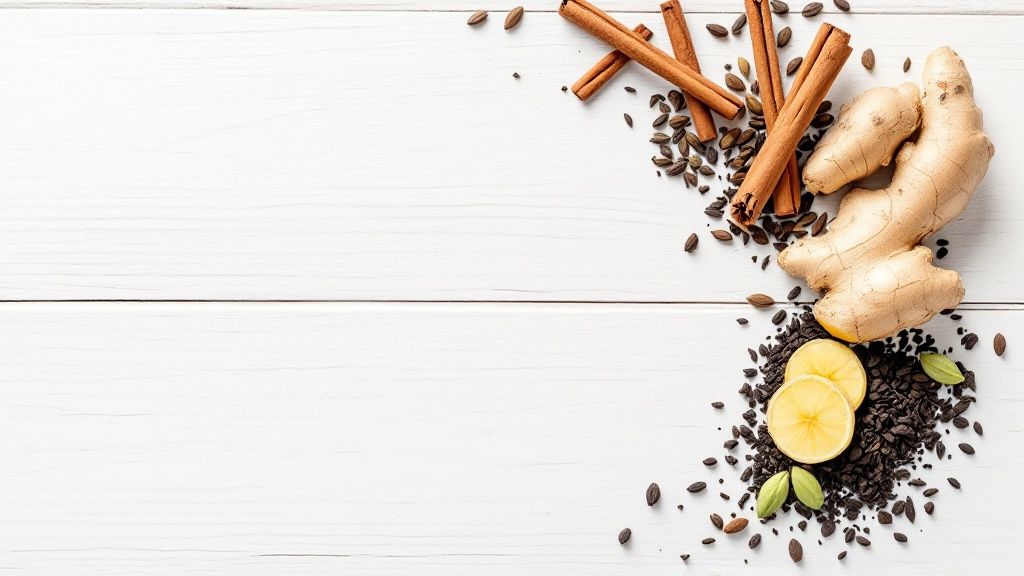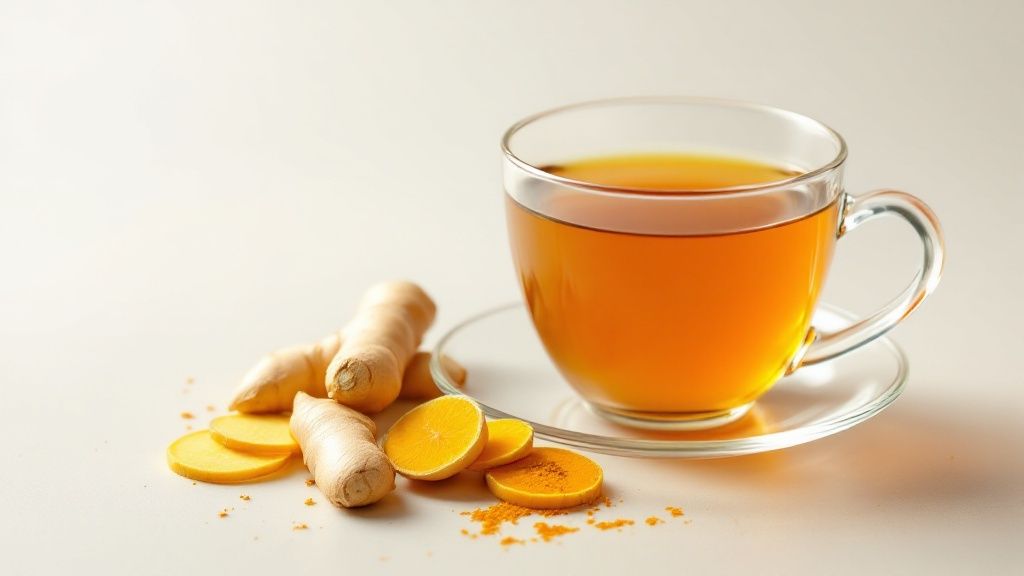The wonderful health benefits of chai tea come from its two core components: a base of antioxidant-rich black tea and a whole symphony of medicinal spices. This beautiful, aromatic brew does wonders for everything from digestion and reducing inflammation to supporting heart health and immune function. It’s a genuinely delicious way to give your daily wellbeing a little boost.
What Makes Chai a Healthy Choice
Step into the aromatic world of chai, and you'll find it's so much more than just a comforting cuppa. At its heart, traditional masala chai is a carefully considered blend of robust black tea and a handful of potent, warming spices. This isn't just a random mix thrown together for flavour; it’s a time-honoured combination where every single ingredient plays its part.
Think of it as a team effort in your mug. The black tea base lays down a solid foundation of antioxidants called flavonoids, which are brilliant at protecting the body from the daily grind of cellular stress. Then, one by one, the spices jump in, each bringing its own unique therapeutic gift to the party.
The Power Players in Your Cup
The real magic of chai is hidden in its spice blend. While the exact recipe can differ from one family to the next, a classic masala chai usually features a core group of spices that have been celebrated for their wellness properties for centuries. Getting to know them is the first step to truly appreciating the full spectrum of chai's health benefits.
To give you a better idea, here’s a quick look at the main spices and what they're celebrated for:
Chai's Powerhouse Spices at a Glance
This table gives you a quick summary of the core spices you’ll find in a traditional chai and the main health benefit each is celebrated for.
| Spice | Primary Health Benefit | Flavor Profile |
|---|---|---|
| Ginger | Digestive Aid & Anti-Nausea | Pungent, spicy, warming |
| Cinnamon | Blood Sugar Regulation | Sweet, woody, warm |
| Cardamom | Digestion & Breath Freshener | Aromatic, floral, slightly sweet |
| Cloves | Antioxidant & Anti-inflammatory | Pungent, sweet, slightly bitter |
Each spice brings something special to the table, creating a brew that’s as complex in its benefits as it is in its flavour.
Together, these spices create a holistic effect, working in harmony to support your body's natural processes. It’s this collective action that elevates chai from a simple tea to a functional, health-boosting beverage.
This powerful blend is finally getting the recognition it deserves far beyond its origins. Here in the United Kingdom, where tea is practically a religion, more and more of us are turning to spiced blends for their wellness advantages. While a classic black tea will always have its place, the growing interest in chai is largely driven by its anti-inflammatory and digestive benefits, which fits perfectly with a more health-conscious mindset.
Of course, each of these ingredients contributes to the vast array of different types of tea available worldwide, each with its own unique profile and story.
Fighting Inflammation and Cellular Stress
One of the most celebrated health perks of a good cup of chai is its knack for tackling inflammation and shielding your body from cellular stress. Picture your body as a busy city, constantly exposed to things like pollution, stress, and less-than-ideal food choices. This daily grind creates unstable molecules called free radicals—think of them as tiny troublemakers causing damage to your cells. This process is known as oxidative stress.
If you let this damage build up, it can lead to chronic inflammation. This isn't the acute kind you get with a sprain; it's a persistent, low-level irritation linked to all sorts of long-term health problems. This is where the powerful spices in chai really shine. They're loaded with antioxidants, which are essentially your cells' own private security team.
These antioxidants go to work neutralising the free radicals, stopping them in their tracks before they can do any real harm. A daily cup of chai gives you a potent dose of these protective compounds, helping to keep your internal city running peacefully.

The Antioxidant Power of Tea and Spices
The black tea that forms the base of any proper chai is already a great source of antioxidants known as flavonoids. These compounds are famous for their ability to fight oxidative stress and support general well-being. But the real magic happens when you bring in the spices.
When you add fragrant spices like cinnamon, cloves, and ginger, you’re not just adding flavour—you're dramatically ramping up the brew's antioxidant firepower. Each spice brings its own unique set of protective compounds to the party.
For example, cloves have one of the highest antioxidant counts of any food out there, while cinnamon is packed with polyphenols that help protect your cells from damage. It’s this team effort that makes every cup such a formidable defence against the daily grind.
Think of it like putting a cool, soothing compress on irritated skin. The anti-inflammatory compounds in chai work in much the same way, just from the inside out. They help to calm and quieten the chronic inflammation that can throw your body off balance.
Key Spices and Their Anti-Inflammatory Roles
Some of the spices in chai are particularly good at getting to grips with inflammation. They contain active compounds that have been studied for their potent effects, and understanding how they work really shows you the depth of chai's benefits.
Here are a few of the star players in the blend:
- Ginger: This fiery root contains a powerful compound called gingerol, which is well-known for its strong anti-inflammatory properties. It works to reduce pain and swelling, making it especially good for soothing sore muscles and joints.
- Cinnamon: More than just a comforting flavour, cinnamon contains cinnamaldehyde. This nifty compound helps to block the proteins that kick-start inflammation in the first place, helping to keep things calm internally.
- Cloves: Rich in a compound called eugenol, cloves offer a double whammy of antioxidant and anti-inflammatory support. Eugenol is known for its ability to block inflammatory pathways in the body.
This powerful trio works together beautifully, offering a natural way to help manage and reduce systemic inflammation.
It's not just chai spices, either; other natural ingredients like olive oil also offer amazing benefits in the fight against inflammation. You can explore the olive oil anti-inflammatory benefits to find even more ways to support your body's wellness through your diet. By bringing these natural ingredients into your routine, you can build a brilliant foundation for long-term health.
How Chai Can Settle Your Stomach
Beyond its comforting warmth and layers of flavour, one of chai's most celebrated perks is what it can do for your digestive system. If you've ever felt that sluggish, bloated feeling after a big meal, the spices in a good chai can offer some surprisingly gentle and natural relief.
Think of your digestive tract as a delicate ecosystem. When everything is in balance, it runs smoothly. The unique blend of spices in chai acts as a sort of botanical support crew, with each one playing a specific role to keep things ticking over nicely. This isn't just old wisdom; the active compounds in these spices have been valued for their digestive properties for centuries.

The Gut-Friendly Spices Doing the Heavy Lifting
While the whole blend works in harmony, a few star players are particularly brilliant for digestive health. They're known to help with common complaints like indigestion, bloating, and nausea, which is why a cup of chai after a meal can feel so right.
Let's look at what these spices bring to the party:
-
Ginger (Zingiber officinale): Famous for settling an upset stomach, ginger contains a powerful compound called gingerol. This clever compound helps speed up the rate at which your stomach empties, which can be a huge help if you often feel uncomfortably full. It's also fantastic at calming feelings of nausea.
-
Black Pepper (Piper nigrum): More than just a bit of heat, black pepper contains piperine. This gets your pancreas to produce more digestive enzymes, which are essential for breaking down fats and carbs, making the entire digestive process much more efficient.
-
Cardamom (Elettaria cardamomum): If bloating and gas are your nemeses, cardamom is your best friend. It’s what’s known as a carminative, meaning it helps stop gas from forming in the first place and aids in its expulsion. A true hero for relieving that tight, uncomfortable feeling.
-
Cloves (Syzygium aromaticum): Another team player, cloves also encourage the secretion of digestive enzymes and can help keep things moving through your system as they should.
It’s this combination of potent spices that gives chai its multi-faceted approach to digestive support. Rather than targeting just one issue, it helps create a healthier, more comfortable environment in your gut.
This holistic effect is a big part of why chai is becoming so popular as more than just a tasty brew. In the UK, there's a growing appreciation for functional drinks, and research has highlighted how chai's bioactive compounds can genuinely improve digestion.
A Recipe for Digestive Harmony
The real magic is in how these spices work together. Ginger soothes the stomach, black pepper gets the digestive juices flowing, and cardamom helps prevent any uncomfortable gas build-up. The result is a delicious brew that actively helps your body process food.
And for those who love the ritual of a warm, spiced drink but are steering clear of caffeine, you don't have to miss out. Herbal or rooibos-based chai blends can offer many of the same spice-driven benefits. If you're looking for some inspiration, have a look at our guide to some wonderful non-caffeinated teas.
Making a cup of chai part of your daily routine, especially after a meal, is a simple, enjoyable way to support your digestive wellness. It’s a lovely, natural way to help everything run that little bit more smoothly.
Supporting Heart Health and Blood Sugar
Beyond its gorgeous aroma and digestive benefits, one of chai's most impressive tricks is its profound impact on our cardiovascular and metabolic health. A daily cup can be a wonderfully comforting way to look after your heart and help keep blood sugar levels steady, all thanks to that clever blend of black tea and spices.
The story really begins with the black tea base. Black tea is packed with flavonoids, a type of antioxidant that’s been consistently linked to better heart health. These compounds work quietly behind the scenes, helping to protect your cardiovascular system from the daily grind. They support everything from blood vessel function to managing cholesterol levels.
Think of it as gentle, consistent maintenance for one of your body's most vital systems. It makes the black tea in your chai so much more than just a vehicle for spice; it's an active player in your long-term wellness.

Cinnamon: The Blood Sugar Regulator
While the black tea sets the stage, cinnamon really steals the show when it comes to metabolic support. This humble spice is a true powerhouse for helping to regulate blood sugar, which is crucial for maintaining steady energy and overall health. So, how does it work its magic?
Imagine cinnamon acting as a friendly guide for the sugar (glucose) in your bloodstream. After you eat, glucose enters your blood, and it's the job of insulin to usher it into your cells for energy. Sometimes, though, our cells can become a bit stubborn and less responsive to insulin's instructions—a state known as insulin resistance.
This is where cinnamon comes in. It helps to improve your cells' sensitivity to insulin, making the whole process much smoother. It means glucose gets moved out of the bloodstream and into your cells more efficiently, helping you avoid those sharp spikes and subsequent energy crashes.
Studies have shown that cinnamon can help lower fasting blood sugar levels by 10–29% in people with type 2 diabetes, showing just how powerful it can be as a supportive part of your diet.
A Team Effort for Your Heart
The benefits don't just come from one or two ingredients working alone. The real power of chai is in the teamwork—the synergy of the entire spice blend. Those anti-inflammatory and antioxidant properties we’ve already talked about play a huge role here in protecting your heart and blood vessels.
Chronic inflammation can damage arterial walls over time, so the calming effects of ginger, cloves, and cinnamon are incredibly valuable. By reducing this underlying inflammation and fighting off oxidative stress, the spices in chai help keep your circulatory system in great shape.
Here’s a quick look at how the key players work together:
- Black Tea: Provides flavonoids that may help reduce both LDL ("bad") cholesterol and blood pressure—two major risk factors for heart disease.
- Cinnamon: Improves insulin sensitivity and helps manage blood sugar, which is closely tied to cardiovascular health.
- Ginger: Its anti-inflammatory action helps protect blood vessels from damage and may also contribute to lower blood pressure.
This combined action makes a simple cup of chai a far more potent ally for your heart than you might think. It’s a delicious daily ritual that offers a multi-layered approach to cardiovascular support, proving that small, consistent habits can make a world of difference.
Brewing Your Own Health-Boosting Chai at Home

Knowing all the wonderful things chai can do for your health is one thing, but bringing that aromatic magic into your own kitchen? That’s where the real joy is. Brewing chai from scratch is a deeply rewarding ritual, filling your home with the most incredible scents while giving you total control over the flavour and potency of your cup.
You'll find that using whole spices makes a world of difference compared to pre-ground powders. Whole spices hold onto their essential oils and active compounds far better, meaning you get the maximum wellness boost and a much richer, more complex taste. A quick, light toasting before simmering unlocks an even deeper layer of aroma.
The growing love for authentic chai here in the UK really shows a shift towards more mindful, health-conscious choices. The market is expanding fast—we’re talking an estimated annual growth rate of around 30%, especially among younger drinkers. It seems we're after more than just a tasty drink; we want beverages with genuine wellness properties. You can find more on the UK's growing chai market on Scribd.
A Classic Stovetop Chai Recipe
Ready to give it a go? This classic recipe is the perfect starting point. Don't be afraid to play with the spice ratios over time to create a blend that’s perfectly you.
What You'll Need:
- 250ml water
- 250ml milk of your choice (whole dairy, oat, or almond all work beautifully)
- 2 tsp loose-leaf black tea (Assam or Ceylon are great choices)
- 1 cinnamon stick
- 4-5 green cardamom pods, lightly crushed
- 3-4 whole cloves
- 1cm piece of fresh ginger, thinly sliced
- 2-3 black peppercorns
- Sweetener to taste (honey, maple syrup, or jaggery)
Step-by-Step Brewing Guide:
- Wake Up the Spices: In a small saucepan, gently toast the cinnamon, cardamom, cloves, and peppercorns over a low heat for about a minute. You'll know they're ready when they smell incredibly fragrant.
- Infuse the Water: Add the water and fresh ginger to the pan. Bring it all to a gentle simmer and let it bubble away for 5-10 minutes. The longer it simmers, the spicier your chai will be.
- Brew the Tea: Pop the loose-leaf black tea into the spiced water. Let it brew for 3-5 minutes, depending on how strong you like your tea base.
- Add the Creaminess: Pour in the milk and bring the mixture back to a simmer, but watch it carefully so it doesn’t boil over. Stir in your chosen sweetener until it’s completely dissolved.
- Strain and Serve: Carefully pour the chai through a fine-mesh sieve into your favourite mug. Now, sit back, breathe in that beautiful aroma, and enjoy your homemade cup of wellness.
For a little more guidance, you might like our dedicated spiced chai tea recipe.
Tips for the Perfect Cup Every Time
Making a truly great chai is an art, but a few simple pointers can help you perfect your technique and avoid any common missteps.
The key to an exceptional chai is all about balance. You want the creamy sweetness of the milk, the boldness of the tea, and the warmth of the spices to exist in perfect harmony—no single flavour should steal the show.
Keep these tips in mind to elevate your brew:
- Don't Rush the Simmer: Giving the spices plenty of time to infuse into the water is absolutely crucial for a full-bodied flavour.
- Crush Your Cardamom: Gently crushing the cardamom pods before you toast them is the secret to releasing their intensely aromatic and flavourful seeds.
- Sweeten at the End: Always add your sweetener last. This way, you can taste as you go and get the sweetness just right for you.
Once you've mastered chai, you might get the bug for creating other health-boosting meals and drinks. You can explore cooking with various ingredients to find your next kitchen adventure.
A Few Final Questions on Chai
We've covered a lot of ground, but there are always a few lingering questions. Let's clear up some of the most common queries about chai, so you can pour your next cup with complete confidence.
What’s the Caffeine Situation?
A classic cup of chai, made with black tea, typically has around 40-60 milligrams of caffeine. That’s about half of what you’d find in a similar-sized cup of coffee.
It’s the perfect amount for a gentle nudge in the morning or a little afternoon lift, but without the risk of those coffee jitters. Of course, the exact amount can change depending on the tea base, how strong you brew it, and your tea-to-spice ratio. If you'd rather skip the caffeine altogether, you can always make a delicious chai using a rooibos or other herbal base instead.
Is Chai a Better Choice Than Coffee?
That’s the million-dollar question, isn't it? The truth is, it really depends on what you're looking for. Neither is 'better' than the other; they just offer different things.
Coffee is a powerhouse of antioxidants and delivers a pretty immediate, powerful energy kick. Chai offers a much more gentle caffeine lift, but it comes with a whole host of spices that are fantastic for soothing inflammation and aiding digestion.
If you find yourself a bit sensitive to caffeine or you're more focused on digestive health and overall wellness, chai is probably your winner. If you just need that strong, immediate boost to get going, coffee might have the edge.
Can I Make Chai a Daily Habit?
Please do! Sipping on chai every day is a brilliant way to consistently reap all those health benefits we've talked about. A daily cup can become a lovely ritual that supports your digestive system, helps keep inflammation in check, and contributes to a healthy heart over time.
Like anything, just be sensible. One or two cups a day is perfectly fine for most people. The only thing to watch is what you’re adding to it—if you're keeping an eye on your sugar intake, just be mindful of any extra sweeteners.
Here at Jeeves & Jericho, we're all about the perfect brew. If you're ready to elevate your daily ritual, explore our authentic, whole-spice Spiced Bombay Chai and other premium teas. You can truly taste the difference that quality makes. Find your new favourite at https://www.jeevesandjericho.com.


